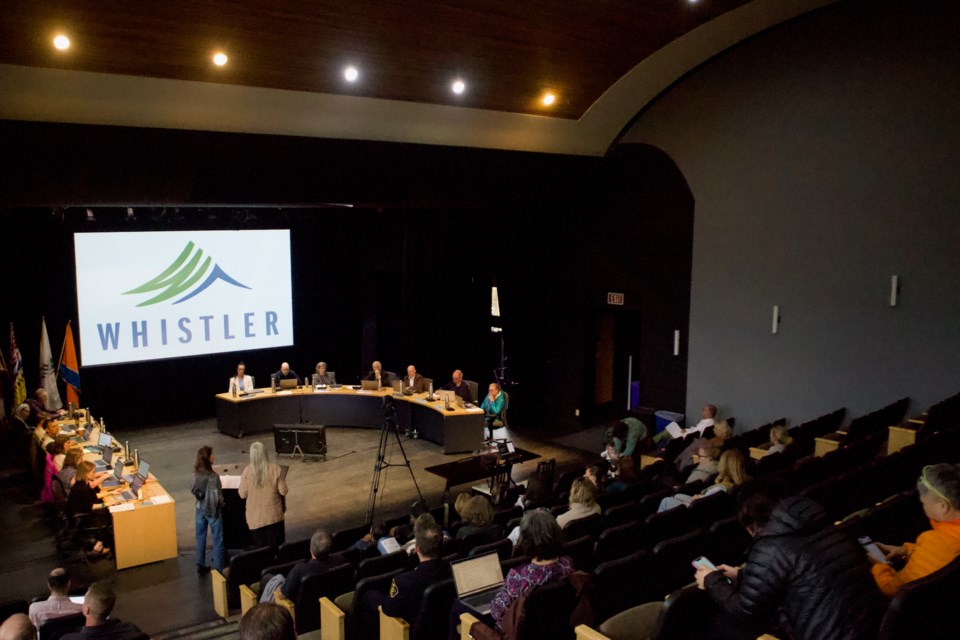The loss of a mother black bear and her three orphaned cubs is rippling through the Sea to Sky, with Whistler residents showing up in force at the May 13 council meeting to demand change.
In an unusual scene for council chambers, rows of chairs were filled by community members grieving the recent death of a lactating sow, killed by the Conservation Officer Service (COS) in late April after a woman was bitten in Kadenwood. The incident left three cubs orphaned and still missing, despite reports of sightings in the days that followed.
Speakers, including wildlife advocates Ellie Lamb and Tina James, called the COS response inadequate and outlined a timeline they say reveals missed opportunities to rescue the cubs. They urged council to adopt a non-lethal bear management protocol and set a precedent for coexistence.
“I would like to adopt a non-lethal protocol as a default approach to bear encounters here in Whistler,” James said. “We can set a precedent and lead the way for our bears. All the people in the community want this.”
While council acknowledged the community’s grief, Mayor Jack Crompton noted the Resort Municipality of Whistler (RMOW) has no jurisdiction over COS operations, which are governed provincially. He pointed to Whistler’s Bear Smart designation—earned in 2011—as a foundation that enables more non-lethal tools than most B.C. communities.
“Whistler was certified as a Bear Smart community in 2011, which changes a lot of the way that the Conservation Officer Service is allowed to do their job here,” Crompton said. “It means that we can engage in more non-lethal practices, which is good news.”
A distinctly poignant moment came when Lil’wat Nation member Clara John spoke. She emphasized the cultural and spiritual significance of respecting bears with tears in her eyes. After introducing herself, John paused for a moment, holding silence which filled the council chambers.
“This bear is very sacred to us,” said John. “Our Nations, they do not ingest this animal in any way. When you go to our ceremonies, you see them. They have the bear dance—that’s to help people heal. And to hear the mother was put down and you have three orphans, it’s very heartbreaking.”
With her hand held over her heart, she called for further education targeting visitors and residents alike and collective responsibility for the bear’s death.
“Bear Smart, you said it's been here since 2011. This is how many years later, 14 years later, we're still dealing with things like this. It's very sad … we have to do better,” she said.
Joan Novak, a longtime resident and local business owner, proposed a new approach for managing wildlife conflicts, based on an acronym: DART—Dart, Ask, Recommend, Transport. She also called for transparency and the use of body cameras on COS officers to build public trust.
Councillors uniformly voiced their support for continued advocacy.
Councillor Cathy Jewett asked staff about the scope of Bear Smart policies and whether education efforts reached residents and workers in high-conflict zones on the edges of the community.
Luisa Burhenne, the RMOW’s environmental stewardship manager, confirmed the municipality funds an annual wildlife safety response officer to work in partnership with the COS and focus on prevention in remote areas and construction zones.
“The Bear Working Group is developing plans and policy,” Burhenne said. “For example, we have the bear response plan that continuously evolves … we’ve also expanded grizzly management within the village into our response plan.”
Coun. Arthur De Jong, who has worked on bear conservation for more than three decades, called the cubs’ disappearance “a very big setback” for a community long recognized for its stewardship.
“What we’ve had here is a setback—failure,” he said. “We need to pick up the pieces and do a much better job of our bear conservation.”
Coun. Jen Ford echoed much of what was said, while highlighting taking the life of an animal weighs heavy on COs she's known over the years.
Elected officials encouraged residents to amplify their concerns to provincial members of the legislative assembly (MLAs), including local MLA Jeremy Valeriote.
“Our voices are really powerful … and hopefully that amplification finds its way to the right decision-makers, and we see a change,” Crompton said.



